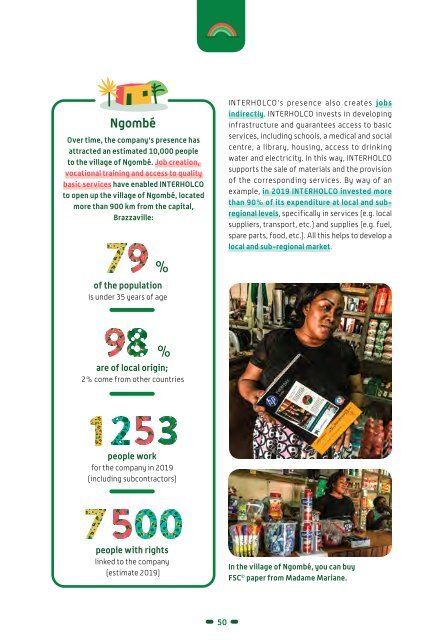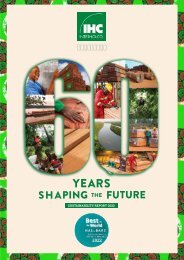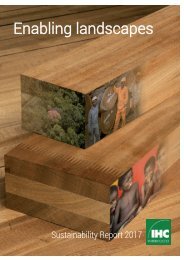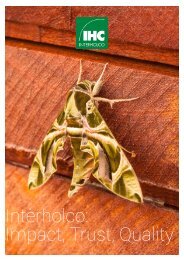An ALLIANCE culture to safeguard Africa's forests
INTERHOLCO invites you to discover "SUSTAINABLE HARDWOOD, MADE IN AFRICA" and the solutions it offers for meeting the major challenges facing the planet. A forest is so much more than just its trees. She is the nurturing mother and source of healing for the local communities and indigenous peoples who have interacted with her over the course of thousands of years. She is the land where their identities, relationships, traditions and cultures come to life; the sacred being animated by their hopes for the future. She is home to thousands of species, from fungi to insects, from birds to gorillas. She regulates the water cycle and the formation of the rainfall that is so critical to the balance of the climate and the survival of the Earth. She offers the world's population a revolutionary material: wood. Known and used since antiquity, it is the only building material that is healthy, natural, sustainable, traceable, recyclable, renewable and carbon positive. See you on our web site: www.interholco.com
INTERHOLCO invites you to discover "SUSTAINABLE HARDWOOD, MADE IN AFRICA" and the solutions it offers for meeting the major challenges facing the planet.
A forest is so much more than just its trees. She is the nurturing mother and source of healing for the local communities and indigenous peoples who have interacted with her over the course of thousands of years. She is the land where their identities, relationships, traditions and cultures come to life; the sacred being animated by their hopes for the future. She is home to thousands of species, from fungi to insects, from birds to gorillas. She regulates the water cycle and the formation of the rainfall that is so critical to the balance of the climate and the survival of the Earth. She offers the world's population a revolutionary material: wood. Known and used since antiquity, it is the only building material that is healthy, natural, sustainable, traceable, recyclable, renewable and carbon positive.
See you on our web site: www.interholco.com
You also want an ePaper? Increase the reach of your titles
YUMPU automatically turns print PDFs into web optimized ePapers that Google loves.
Ngombé<br />
Over time, the company's presence has<br />
attracted an estimated 10,000 people<br />
<strong>to</strong> the village of Ngombé. Job creation,<br />
vocational training and access <strong>to</strong> quality<br />
basic services have enabled INTERHOLCO<br />
<strong>to</strong> open up the village of Ngombé, located<br />
more than 900 km from the capital,<br />
Brazzaville:<br />
%<br />
of the population<br />
is under 35 years of age<br />
%<br />
are of local origin;<br />
2% come from other countries<br />
people work<br />
for the company in 2019<br />
(including subcontrac<strong>to</strong>rs)<br />
people with rights<br />
linked <strong>to</strong> the company<br />
(estimate 2019)<br />
INTERHOLCO's presence also creates jobs<br />
indirectly. INTERHOLCO invests in developing<br />
infrastructure and guarantees access <strong>to</strong> basic<br />
services, including schools, a medical and social<br />
centre, a library, housing, access <strong>to</strong> drinking<br />
water and electricity. In this way, INTERHOLCO<br />
supports the sale of materials and the provision<br />
of the corresponding services. By way of an<br />
example, in 2019 INTERHOLCO invested more<br />
than 90% of its expenditure at local and subregional<br />
levels, specifically in services (e.g. local<br />
suppliers, transport, etc.) and supplies (e.g. fuel,<br />
spare parts, food, etc.). All this helps <strong>to</strong> develop a<br />
local and sub-regional market.<br />
In the village of Ngombé, you can buy<br />
FSC © paper from Madame Mariane.<br />
Due <strong>to</strong> its geographical proximity <strong>to</strong> fragile and<br />
war-afflicted countries, by the end of 2016 35 ,<br />
RoC was hosting 54,000 refugees and asylum<br />
seekers, mostly from the DRC, Central African<br />
Republic and Rwanda. The shops in the village of<br />
Ngombé are run by Rwandan, Cameroonian and<br />
Congolese (DRC) traders who have found their<br />
vocation in the services they provide <strong>to</strong> the local<br />
community: hairdressing salons, where clients<br />
choose their hair with the help of a tablet, cafés<br />
and restaurants, nightclubs, a market, sewing<br />
workshops, grocery shops, small shops, several<br />
churches and mosques, hardware shops, card or<br />
telephone credit card dealers and more.<br />
INTERHOLCO is also responsible for the<br />
construction and maintenance of permanent<br />
roads.<br />
According <strong>to</strong> the World Bank, “roads are the<br />
arteries through which the economy pulses. By<br />
linking producers <strong>to</strong> markets, workers <strong>to</strong> jobs,<br />
students <strong>to</strong> school, and the sick <strong>to</strong> hospitals,<br />
roads are vital <strong>to</strong> any development agenda. 36 ”<br />
In Oc<strong>to</strong>ber 2019, the Managing Direc<strong>to</strong>r of IFO (a<br />
subsidiary of INTERHOLCO) signed an agreement<br />
with the Congolese state. The objective is <strong>to</strong><br />
participate in the construction of a road <strong>to</strong> link<br />
the north of the country directly with the port<br />
of Pointe-Noire. This 1,460 kilometre-long road<br />
was the main route out of Brazzaville <strong>to</strong>wards<br />
the north of the country at a time when the<br />
N2 highway had not yet been asphalted. Once<br />
completed, the road will make it possible <strong>to</strong> cross<br />
the Alima River by ferry. For more than 20 years,<br />
it has only been possible <strong>to</strong> cross the Alima River<br />
by dugout canoe.<br />
We left Rwanda in 1994,<br />
stayed in Zaire until 1997 and then<br />
we came <strong>to</strong> the Congo. In Rwanda I<br />
ran a business and here I am trying<br />
<strong>to</strong> do the same. We are fighting for<br />
our children, who are at school in<br />
Brazzaville. We have three children,<br />
born in 1999, 2004 and 2011. It<br />
takes a lot of time and money <strong>to</strong><br />
support them. We sell bread,<br />
drinks and rice here - basic products<br />
tailored <strong>to</strong> our cus<strong>to</strong>mers'<br />
requirements. A whole bag of rice,<br />
weighing 25 kilos, can be bought for<br />
25,000 CFA - it is the most expensive<br />
product.<br />
Jean-Marie Vianey ZABILINDA<br />
A Rwandan refugee, who has been<br />
running a food shop in the village of<br />
Ngombé since 2014<br />
35<br />
Data provided by the Office of the United Nations High Commissioner for Refugees.<br />
36<br />
Claudia Berg, Uwe Deichmann, Harris Selod ‘How Roads Support Development’, World Bank blogs : https://blogs.worldbank.org/<br />
developmenttalk/how-roads-support-development<br />
50 51














